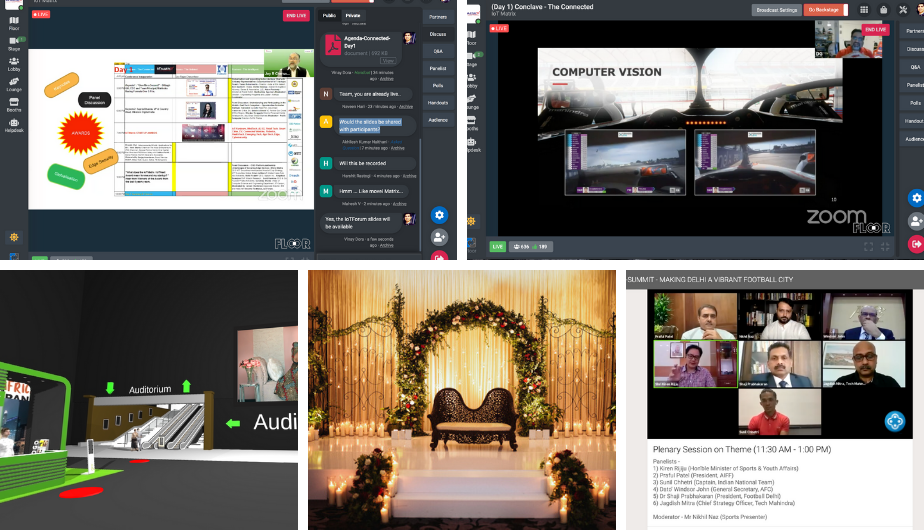
The behavioural trends we have seen in the past 10 months seem to have ellipsed those witnessed during the entire past decade. We have seen a shift in every sphere of our lives, right from the way we learn, our habits around health and hygiene, to how companies work and engage their potential customers.
Like many of you, this new normal has given me a perspective of the growing MICE (Meetings, Incentives, Conferences and Exhibitions) Industry, and how it could shape the next decade.
The reason why I, in 2015, moved from a pure digital crowdfunding platform space to leveraging events for outcomes was due to the realisation that in many cultures, people entrusted those they met in person, rather than a kickass project listed on a digital platform.
While most physical events do have the trust factor covered, the return on investment for the time and money spent were often deliberated upon, and therefore we were more involved in realising outcomes through audience engagement and technology tools.
Here are some of my virtual events learnings from 2020, as well as some predictions for 2021 and beyond.
Content - the key to marketing events
As the audience, the question that often comes to mind is why should one take time to attend an event, and what would be the learnings and takeaways for the time spent? These questions are especially pertinent when it comes to online platforms – something I learnt during my crowdfunding days.
Asking a project-owner why someone should contribute to their project online often provided the clarity needed to realise one’s crowdfunding campaign goal. Today, with users having many options online to learn and be entertained, coherent event content can make all the difference in attracting audiences.
The optimal event duration
Should a virtual conference be spread over a few days or an entire day? On the one hand, it could seem back-breaking or just plain boring to have to sit in front of a laptop in your room for an entire day. On the other, if it were a couple of hours each day and spread over many days, there’s a chance of losing attendees on subsequent days.
Virtual events have yet to reach the captivating cult of a popular TV series. On a serious note, in my experience, the format that has worked for large virtual conferences is that of a same-day shorter duration event with parallel sessions happening simultaneously.
Unlike a physical event where frequent audience movement can be annoying for others, virtual platforms have the advantage of moving from one track to another seamlessly. For those keen on watching all sessions, remember that most event organisers have recordings that you can ask for or view on their youtube channels.
Know your speakers well and your moderator too
This may sound like a cliche, but the importance of crisp and articulate speakers seem much more critical for a virtual event. Courtesy Twitter’s ‘Larry the Bird’, soon a goldfish could have thrice as much as attention as we humans. This outrageous claim reiterates the importance of your speakers being able to enthral the audience and the moderator playing the all-important role of the orchestra’s conductor.
Mixing sessions with a few rounds of speaker insights, some rapid-fires, tweetable quotes, anecdotal inferences, along with time to spare for Q&A, can help keep audiences hooked to panel discussions.
If your event’s the engine, sponsors are its fuel
The good news is that today, we have many ways to engage the audiences productively on the health of brands. Running virtual competitions, snap polls, quizzing with instant results, gathering predictions, answers and social media contests can enable one to capture useful audience inputs and provide a rewarding experience for all stakeholders.
Based on the engagement points, session and event analytics, sponsors can better measure the effectiveness of their event participation, evaluate the return on investment, increase their net promoter score or what their event participation goals may be.
Most partners support events either for increased brand awareness, creating goodwill among potential customers, lead generation or even for pursuing market research and talent scouting - all of which if communicated well before-hand, can be realised in a planned manner.
The rise and rise of virtual event platforms
While Zoom-like video-conferencing platforms have 2020 to thank for becoming part of our lexicon, there have also been many virtual event platforms that have offered great experiences. Having been part of a few platform evaluation teams, the questions often posed by event organisers include – can it replicate my exact physical conference’s experience?
How visually-appealing is the platform – will my audience be wowed? Will you provide us with technical support throughout? How much is the learning curve? Has your platform been stress-tested to handle a large audience?
In my opinion, the final two questions are most important, particularly keeping in mind the audience and speakers experiences. Hence, those platforms that focus on user experience, flexible to third party integrations and are stable, seem to get more orders.
What could be our event engagement experiences for 2021 and beyond?
Food, beverages, goody bags and Gift Vouchers offered to Attendees
There have been a couple of conferences that I know of, which have taken advantage of India’s food delivery platforms, to have food delivered to their virtual participants. Expect more sure activities, including goody bags, gifts and even beer soon being delivered, subject to each region’s regulations.
However, this could pose an additional challenge, wherein the virtual attendee could be more worried about his or her food delivery than actually participating productively at sessions. Digital rewards like ecommerce gift vouchers or access to digital solutions seem easier to handle.
Creating more optics with virtual avatars, AR and VR experiences
People love visually-appealing content and especially if it’s novel. Conference organisers can leverage virtual avatars, holograms, 3D video storytelling, augmented reality content, and even virtual reality headsets that create an immersive experience.
While innovative visual communication technologies are going to grow rapidly, it’s also important to always keep in mind the purpose of the conference to avoid getting too distracted.
New job roles and evolving older designations
In the past, a dozen conferences I have been part of, we have had team-members wearing the hats of Platform Coordinators, Audience Experience Designers, Sponsor Success Managers, Virtual Session Chairs, Zoom Jockeys, Livestream Engagement Leaders, and those Social Media and Content Marketers whose roles have been further fine-tuned to drive results in line with the latest event format’s objectives.
We have also been involved with the awards experience and press conferences, all of which today can be orchestrated virtually.
Increased third party integrations and strategic partners to succeed
It may not be feasible for companies to have the entire gamut of event experiences and platform features built in-house as the whole space is evolving, and hence, the need to integrate or make use of third party solutions on-demand. Also, to think of it, companies and team-members have their own strengths and if co-opted well, it could turn into a force-multiplier.
Even prior to the pandemic, during physical events, the organisers would introduce us to their app partner or sponsors or other team-members look for engagement plans. This may well become the norm during virtual experiences as well.
Hybrid Events or Phygital Technologies are the Future of Events
Hybrid events are made for the COVID-19 era, wherein a maximum of 20 or 50 people gather at a single location, depending on the local rules, while thousands of others participate remotely. A hybrid event format brings together the charm of physical presence as well as the convenience of remote participation.
Event organisers need to treat the physical and virtual event as two separate experiences. After all, the virtual event speakers and participants may not accept the excuse of a session being delayed. Expect these instances to bring to the fore, more audience experience designers and technology solutions that bridge the digital world with the physical world. And a lot more jargons too!
Edited by Kanishk Singh
(Disclaimer: The views and opinions expressed in this article are those of the author and do not necessarily reflect the views of YourStory.)
Link : https://yourstory.com/2020/12/virtual-events-learnings-2020-future-industry-trends
Author :- Vinay Dora ( )
December 28, 2020 at 02:23PM
YourStory


